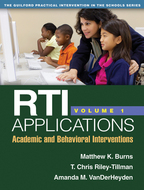RTI Applications, Volume 1
Academic and Behavioral Interventions
Matthew K. Burns, T. Chris Riley-Tillman, and Amanda M. VanDerHeyden
A Paperback Originale-bookprint + e-book
A Paperback Original
orderFebruary 9, 2012
ISBN 9781462503544
Price: $45.00 226 Pages
Size: 8" x 10½"
See related items for this product
This book addresses a crucial aspect of sustaining a response-to-intervention (RTI) framework in a school: selecting interventions with the greatest likelihood of success and implementing them with integrity. Leading RTI experts explain how to match interventions to students' proficiency levels, drawing on cutting-edge research about the stages of learning. Effective academic and behavioral interventions for all three tiers of RTI are described in step-by-step detail and illustrated with vivid case examples. In a convenient large-size format, the book features more than 40 reproducible planning tools and other helpful forms. Purchasers also get access to a Web page where they can download and print the reproducible materials.
See also RTI Applications, Volume 2: Assessment, Analysis, and Decision Making, which provides tools for assessing the effectiveness of RTI practices.
See also RTI Applications, Volume 2: Assessment, Analysis, and Decision Making, which provides tools for assessing the effectiveness of RTI practices.
This title is part of The Guilford Practical Intervention in the Schools Series, edited by Sandra M. Chafouleas.
“Filling a gap in the literature, this exceptional book comprehensively describes how effective academic and behavioral interventions can be selected within an RTI framework. Step-by-step guidelines and case examples illustrate how to select interventions and assess intervention effectiveness and fidelity. This book is essential reading for school-based professionals using RTI, as well as for university training programs in school psychology, education, and special education.”
—Tanya L. Eckert, PhD, Department of Psychology, Syracuse University
“The promise of RTI is that every child receives instruction matched to his or her needs. Teachers understand the rationale and urgency for implementation, yet the nuts and bolts of implementation—particularly for classroom teachers—are more challenging. This book not only describes the 'how-tos,' but also identifies evidence-based interventions for both academics and behavior that make problem solving more practical for teachers. Every building leadership team and professional learning community should own this book.”
—Amber Roderick-Landward, MEd, Director of Evidence-Based Learning, Canyons School District, Utah
“The authors provide an excellent framework for selecting academic and behavioral interventions. The use of the 'instructional hierarchy' will help educators make theory-based decisions that will enhance practice. This is a valuable tool for school-based practitioners, university educators, and students. Providing many hands-on examples, the book would serve well as a text in practicum classes focused on academic or behavioral interventions.”
—Mike Vanderwood, PhD, Graduate School of Education, University of California, Riverside
“A valuable resource for educators looking to improve academic and behavioral interventions in the context of RTI. Readers will gain an understanding of how to select, implement, and evaluate interventions at Tiers 1, 2, and 3 of the RTI model, while using data to guide decision making at every step. The authors provide detailed information about a range of academic and behavioral interventions for individual students, groups, classrooms, or entire schools. As a trainer of school psychologists, I can see this book being used as a text in graduate courses addressing school consultation, assessment, and intervention.”
—Angela J. Whalen, PhD, Department of Special Education and Clinical Sciences, University of Oregon
Table of Contents
1. Introduction2. Matching the “Right” Intervention to the Student
3. Selecting Group Interventions: Identifying a Classwide Problem
4. Whole-School Behavioral Interventions
5. Small-Group Academic Interventions
6. Classwide/Small-Group Behavioral Interventions
7. Academic Acquisition Interventions
8. Behavioral Acquisition Interventions
9. Academic Fluency-Building Interventions
10. Behavioral Proficiency-Building Interventions
11. Maintenance and Generalization of Behavioral Interventions
12. Maintenance and Generalization of Academic Interventions
13. Putting It All Together
About the Authors
Matthew K. Burns, PhD, is The Rose and Irving Fein Endowed Professor of Special Education at the University of Florida and Assistant Director of the University of Florida Literacy Institute. He is a past editor of School Psychology Review and Assessment for Effective Intervention. Dr. Burns’s research focuses on the use of assessment data to determine individual or small-group interventions. A coauthor of the Path to Reading Excellence in School Sites (PRESS) reading intervention program, he has published over 210 articles, book chapters, and books.T. Chris Riley-Tillman,PhD, is Professor and Associate Division Director in the Department of Educational, School, and Counseling Psychology at the University of Missouri. He is Associate Editor of School Psychology Quarterly and Assessment for Effective Intervention. His research interests include the development and validation of assessment and intervention methodologies, single-case design, and consultation. The author of five books and over 100 articles and book chapters, Dr. Riley-Tillman is a member of the Society for the Study of School Psychology and a Fellow of the American Psychological Association. He is editor of The Guilford Practical Intervention in the Schools Series.
Amanda M. VanDerHeyden, PhD, is a private consultant, researcher, and national trainer who has worked in a number of school districts and is President of Education Research and Consulting, Inc., in Fairhope, Alabama. She is Associate Editor of School Psychology Review, serves on the editorial boards of several other journals, and has published more than 60 articles, books, and book chapters related to RTI. Dr. VanDerHeyden was named to a National Center for Learning Disabilities advisory panel to provide guidance related to RTI and received the Lightner Witmer Award from the American Psychological Association for her scholarship on early intervention, RTI, and models of data-based decision making.
